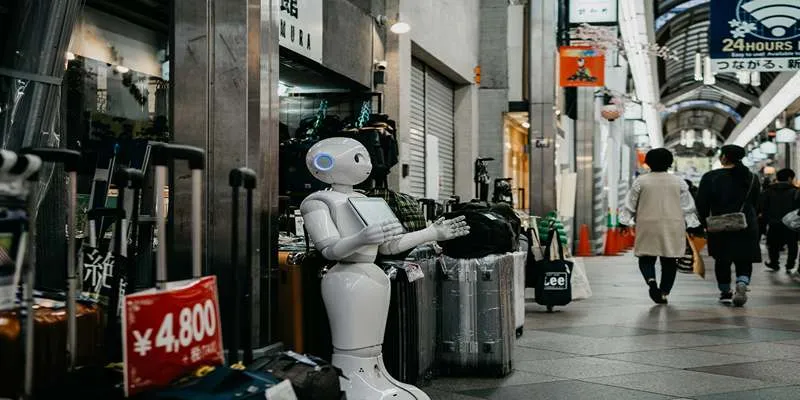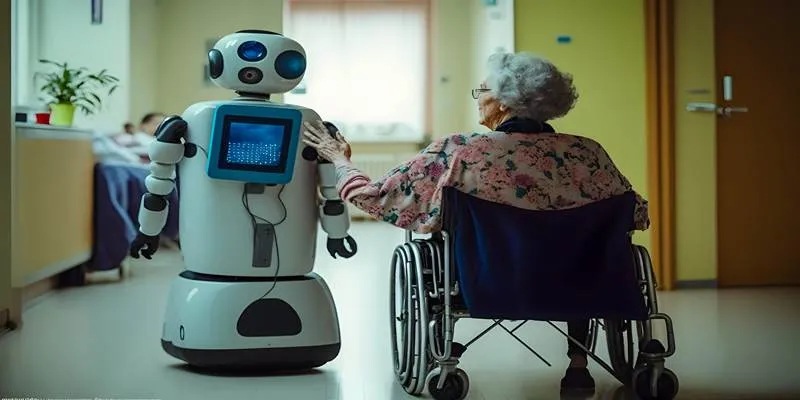AI in healthcare is transforming the landscape of medical practice, especially for the elderly. It promises individualized treatment, early disease diagnosis, and improved access to medical services. As the global population ages, the need for advanced technologies in senior care is critical. AI addresses crucial issues like mobility, chronic diseases, and mental health, enhancing the quality of life for the elderly. Technologies such as AI in medicine and smart monitoring systems are revolutionizing healthcare, making it more effective and modern.

AI in Healthcare: Transforming Senior Care
AI-Driven Diagnostics for the Aging Population
AI plays a pivotal role in the early diagnosis of diseases among seniors. Machine learning algorithms analyze radiographs, blood biomarkers, and genetic markers, detecting preliminary stages of chronic illnesses like cardiovascular diseases, diabetes, and neurological disorders. AI’s ability to process vast amounts of data aids doctors in making accurate predictions and recommending necessary precautions. This is particularly beneficial for diagnosing dementia and Alzheimer’s, as cognitive assessment tools monitor changes in memory and behavior, improving the quality of life for the elderly.
Remote Patient Monitoring and AI Assistance
AI-enhanced remote patient monitoring is revolutionizing senior healthcare. Real-time insights enable healthcare providers to act swiftly, reducing hospitalizations. AI-supported telemedicine solutions facilitate remote consultations, minimizing the need for frequent clinic visits. Predictive analytics in AI helps identify health patterns and alerts doctors to potential complications, empowering seniors to manage their health more independently.
Senior Care Technology: Enhancing Quality of Life
AI in Assisted Living and Home Care
AI-based robots assist caregivers with mobility, medication reminders, and social interaction. Smart home automation systems enhance safety by detecting falls, adjusting lighting, and monitoring seniors’ activity levels. These advancements allow elderly individuals to live comfortably in their preferred environments, meeting their unique needs.
Personalized AI Health Solutions for Older Adults
AI in healthcare tailors treatment plans based on medical history, behavior, and family history. Health and fitness applications offer personalized exercises, diets, and mental well-being programs for seniors. Chatbots using natural language processing (NLP) remind seniors about medications, doctor visits, and answer health-related queries, reducing loneliness and improving their psychological state. These AI-driven solutions promote healthy living and reduce reliance on caregivers and healthcare facilities.

Aging Population Health Solutions: Addressing Key Challenges
AI in Mental Health Support for Seniors
AI offers emotional support and cognitive therapy through social robots and AI-based companions, engaging seniors in dialogue to alleviate loneliness. These models monitor behavior to detect signs of depression or memory loss. Cognitive training apps utilizing AI enhance memory and problem-solving skills, helping seniors avoid mental health issues.
AI’s Contribution to Mobility and Rehabilitation
AI advancements in synthetic limbs, bionics, and exoskeletons improve mobility, allowing seniors to regain movement. These devices use AI to mimic natural movement patterns, supporting rehabilitation. AI-driven data processing customizes physical therapy programs, aiding recovery after strokes or surgeries.
Ethical and Practical Considerations in AI-Based Senior Care
Privacy and security are paramount in AI healthcare applications. It is essential to establish transparent policies and incorporate encryption measures to protect patient data from cyber threats. Ensuring AI models are free from bias is crucial to providing equitable treatment to elderly patients.
Conclusion
AI is revolutionizing senior care through early diagnosis, personalized care, and enhanced quality of life. Technologies like diagnostics, remote care, and mental health support enable seniors to live healthier lives. However, addressing ethical concerns, data protection, and integrating human care remains vital. As AI advances, its role in elderly care will expand, shaping a future where seniors receive optimal assistance.
 zfn9
zfn9






















